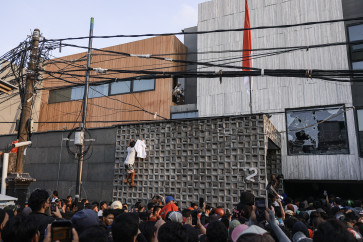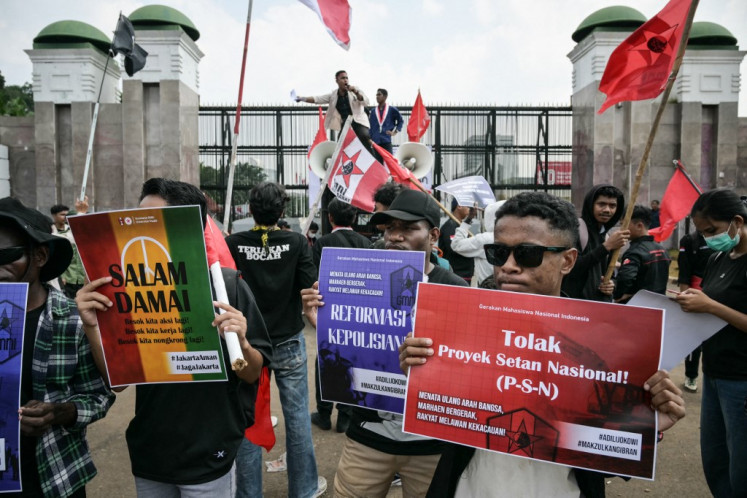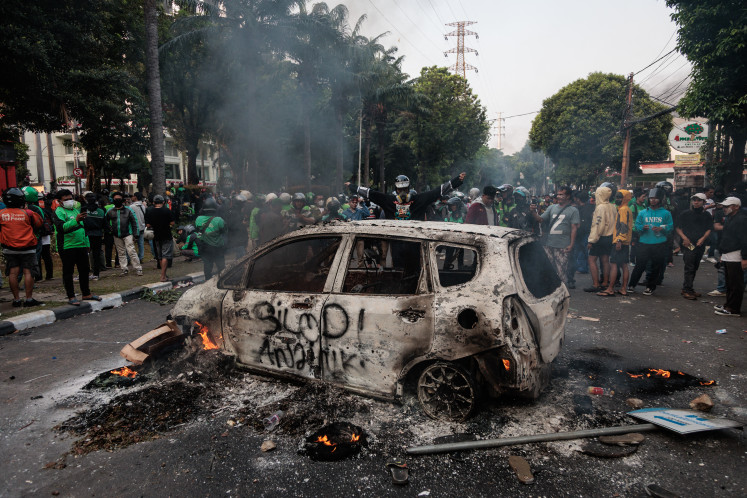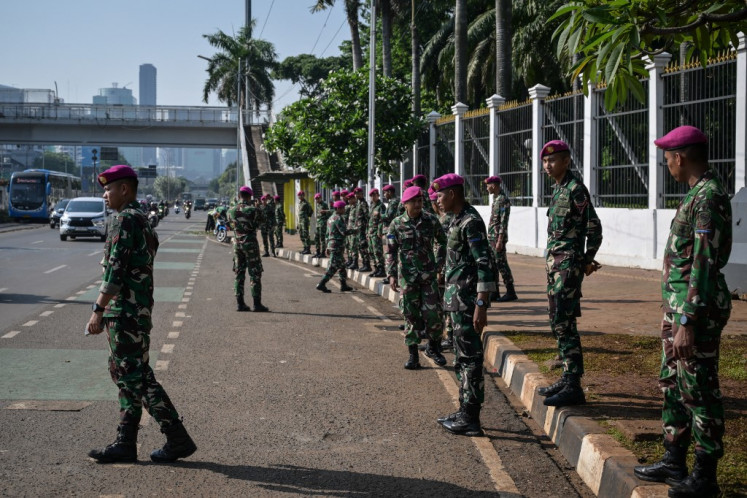Popular Reads
Top Results
Can't find what you're looking for?
View all search resultsPopular Reads
Top Results
Can't find what you're looking for?
View all search resultsHow Qaddafi rewrites the script in the Arab drama
Before the United States and its allies launched air strikes on Libya on March 19 to enforce a UN no-fly zone, the evolving drama in much of the Arab world had really been about how the people there were revolting against their long-time despotic rulers
Change text size
Gift Premium Articles
to Anyone
B
efore the United States and its allies launched air strikes on Libya on March 19 to enforce a UN no-fly zone, the evolving drama in much of the Arab world had really been about how the people there were revolting against their long-time despotic rulers. The US and much of the rest of the world had largely been content, confined to the role of an amazed if not confused audience to the spectacular changes taking place throughout the Middle East and North Africa.
The uprisings in Tunisia and Egypt suggest that the tide of freedom in this region was so strong that one by one long-established regimes would collapse to make way for democracy. All of this was taking place without any outside push — not even from a Western world that has championed democracy but when it came to dealing with the Arab world had staunchly supported its autocratic rulers.
This story line seems too good to be true for a real life drama, and, sure enough, the script has now been rewritten in the past week. Meet the new director-cum- scriptwriter-cum-main actor: Col. Muammar Qaddafi.
The embattled Libyan leader has bucked the trend and in the process may have turned the flow of the Arab drama in a completely new direction. He has even brought the international community onto the stage and divided world public opinion, which had until then singled him out as the lone bad guy in this play. Now he shares that honor with the US and its allies.
How did Qaddafi, a man who has no scruples about killing his own people, pull this off?
Whether by a stroke of luck or a stroke of genius, he assumed a greater degree of control over events happening in his country just as the international community thought he was losing it. He is virtually writing the script himself, and probably will be for the next few acts though not necessary to the end.
For several weeks before March 21, the world had idly watched the uprisings in Libya and how rebels took control of several towns, including Benghazi in the east.
The scenes on TV news coming out of Libya, however, became very disturbing when Qaddafi began deploying his fully armed military to quash the rebellions as he tried to cling to power. He did what Hosni Mubarak of Egypt and Ben Ali of Tunisia did not have the guts or heart to do — kill his own people in large numbers.
Pressure had been mounting on the United Nations to intervene and prevent events in Libya from becoming a bloodbath. On March 17, the UN Security Council passed a resolution declaring a no-fly zone over Libya in order to protect Libyan civilians from being massacred. The resolution was passed unopposed, but was not unanimous with Russia, China, Germany, Brazil and India abstaining.
Qaddafi responded by immediately declaring a ceasefire but at the same time intensifying attacks against rebel strongholds in the east. His actions forced an emergency meeting among world powers about enforcing the no-fly zone resolution. With the support of some Arab countries, the United States, France and Britain began weekend air strikes.
As devastating as the coalition military campaign may have been on pro-government Libyan forces, Qaddafi finally got what he had been searching for all this time as he struggled to put down the rebellion — someone to blame, a bogeyman he can point his finger at to defend his brutal actions.
Immediately after the first round of coalition forces air strikes, a defiant Qaddafi declared war against the United States and its allies. For good measure, he invoked a holy Islamic war against “infidels.” Only two or three weeks earlier he had desperately tried to blame the uprising on outsiders, first on al-Qaeda and later on the West, but no one believed him then. Now, he has the United States — “the evil empire” — exactly where he wants it.
Helping his cause is the confusion that has erupted within the coalition about who should lead the military campaign, with the United States refusing to take up the role. The North Atlantic Treaty Organization was not all that keen either. There are also questions about the objective of the campaign and whether Qaddafi himself should be a target.
At home, President Barack Obama is facing severe criticism for effectively committing the US military to a third war when it is struggling to end ongoing military campaigns in Iraq and Afghanistan.
Meanwhile, world public opinion has also turned against the United States and its allies, with critics saying that the coalition has gone beyond the mandate of the no-fly zone. Russia and China, which could have vetoed the resolution, are leading the criticism. Several Arab countries, which had practically begged for international intervention, have now turned their backs on the coalition.
In the eyes of some, Qaddafi has even managed to cast himself in a new role in this constantly evolving Arab drama, going from villain to hero. If he remained a villain, at least he was sharing that stage with others, particularly the United States.
But now Qaddafi has provided the perfect example for other despotic rulers in the region in how to deal with their own uprisings besides giving in to popular demand. Taking their cue from Tripoli rather than from Cairo or Tunisia, regimes in Bahrain, Yemen, Saudi Arabia and Syria are now coming down harshly on their uprisings. Killing is a key part of the solution.
This Arab drama is fast turning into an Arab tragedy unless someone else takes control of the script and takes the director’s seat from Qaddafi.
The writer is a visiting fellow at the East-West Center in Washington and a senior editor at The Jakarta Post.










